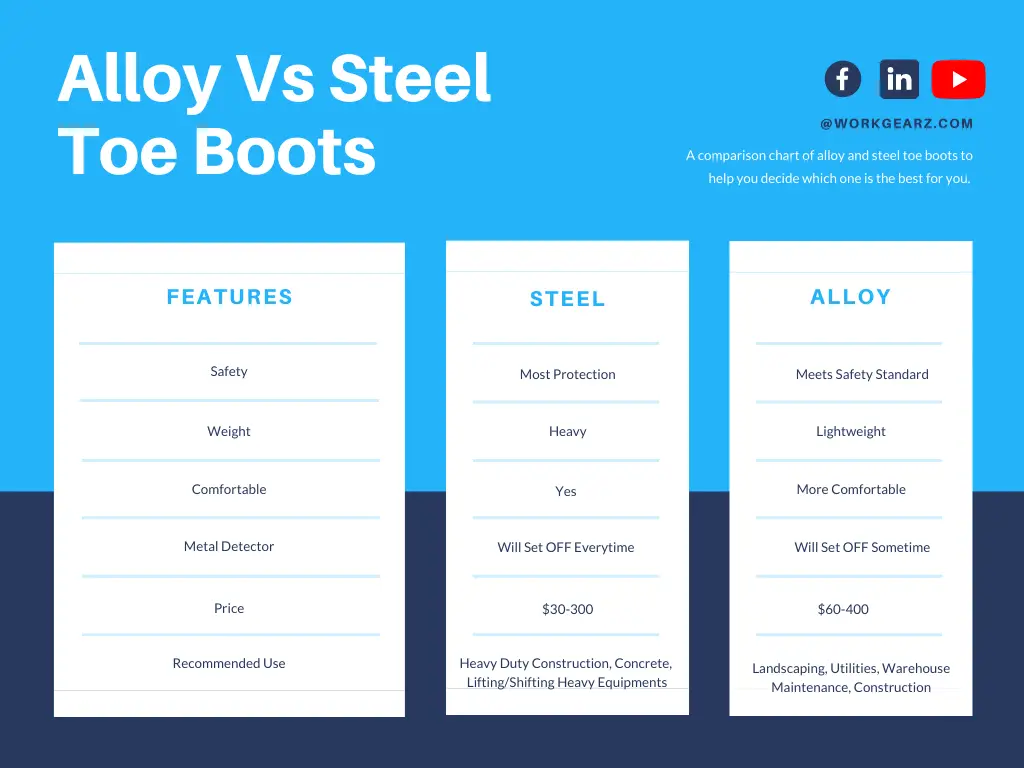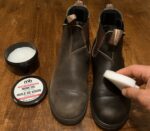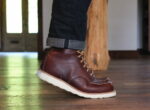Most of the Alloy and Steel Toe Boots meets the ASTM F2413-11 M I/75 C/75 ratings. But alloy toe is 30-50% lighter than steel and made of thinner material such as aluminum or titanium. On the other hand, steel toe boot is cost-effective, most popular, and offers the best protection.
In this post I’m going to put Alloy and Steel toe boots to test. So if you’re looking for a DEEP comparison of these two popular types of work boots, you’ve come to the right place.
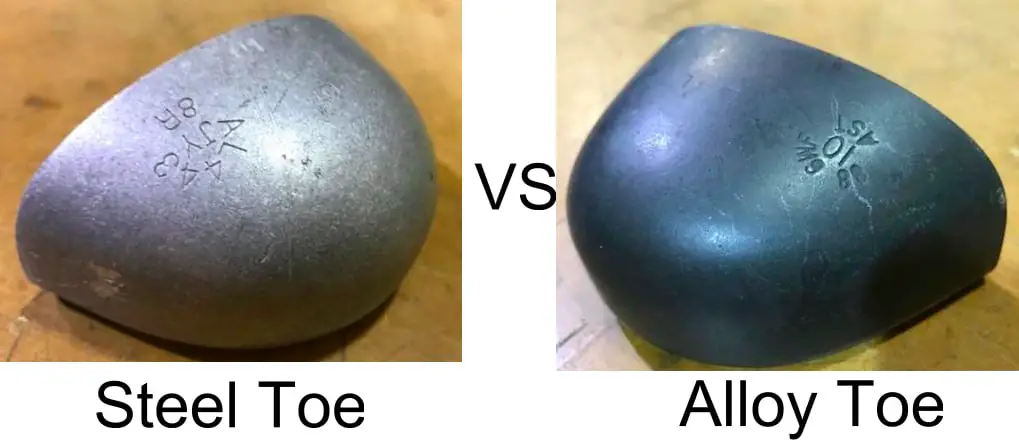
Because in today’s post I’m going to compare Alloy vs. Steel Toe boots in terms of:
-
-
- Protection features
- Comfort analysis
- Weight
- Pricing and value
- Unique features
- And lots more
-
In a Hurry… Let’s look at a quick comparison of two
Alloy vs Steel Toe Boots Features Comparison Chart (PDF)
Introducing: The Two Competitors
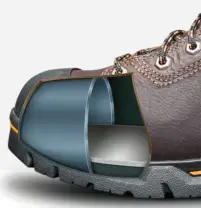 First, we have the most popular and oldest safety boot STEEL TOE.
First, we have the most popular and oldest safety boot STEEL TOE.
Steel Toe has been the safety standard for workers from over 80 years.
It is most popular among people working with heavy equipment, construction and industrial works.
The classic steel toe boot is made from heavy-duty steel, coated with rust-resistant material. Generally, steel toe caps protect the toe but can extend to the midsole to protect from punctures below.
Steel Toe boots has a ton of features that make it a direct competitor to Alloy Toe, including:
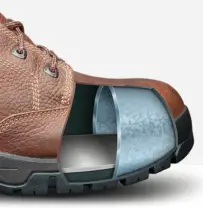 Alloy Toe is made from lightweight materials such as military grade aluminum, titanium or a combination of other light weight materials.
Alloy Toe is made from lightweight materials such as military grade aluminum, titanium or a combination of other light weight materials.
That way, you don’t have to worry if you have to stand the whole day wearing them. Just put your feet in an alloy toe boot and you will feel more space and can stand all day without getting tired.
As you’ll soon see, Alloy toe now has similar features as steel toe. And we’ll compare two boots later.
But it’s important to know that alloy toe boots came to market much later than steel toe, which is why it’s not as popular as steel toe.
Alloy Toe recently gained popularity among electricians, plumbers, warehouse workers and drivers.
In fact, today, people prefer alloy toe due to:
-
- 30 to 50% light weight
- More space in toe area (Thinner material)
- Meet ASTM impact and safety standard
- Comfortable to wear all day
- Lots more
The bottom line is that Steel Toe and Alloy Toe have similar feature sets.
So it’s time to answer the key question: which TOE boot you should buy?
Let’s get started.
Which Toe Offers the Best Protection?
First, I decided to see which toe was best for protecting your feet from impact and compression.
Safety footwear has 3 levels of protection (30, 50, 75), ASTM F-2413 Class 75 is recommended for most protective footwear needs.
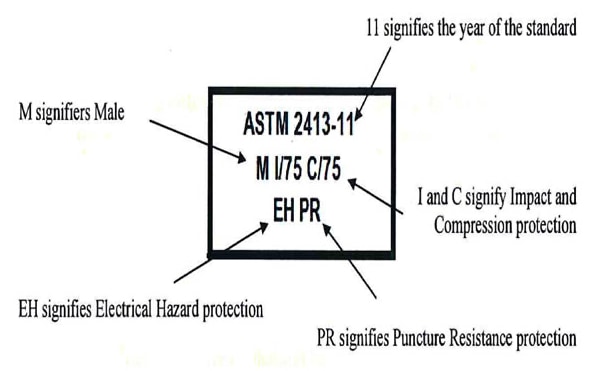
To meet ASTM F-2413 Class 75 standard following test are conducted by an independent laboratory:
1.) Impact: Protection from falling and dropping of heavy objects
50 pounds is dropped on the toe of the shoe from an approximate height of 18 inches, the shoe must withstand the force to receive I/75 certification.
2.) Compression: Protection from rolling objects
The shoe that withstands up to 2,500 pounds of force on the toe receives the C/75 designation.
Why is this important?
The prime objective of safety toe boot is to protect your feet from falling objects and rollover.
Steel Toe is the most popular in the market when it comes to protection.
Let’s see who came out on top.
Steel Toe boots Impact and Compression Rating
|
Steel-Toe Boot |
Safety Rating |
| Timberland PRO Men’s 6″ Pitboss | ASTM F2413-11 I/75 and C/75 |
| Skechers for Work Men’s Workshire | ASTM F2413-2011, I/75 C/75 |
| ARIAT Men’s Groundbreaker Pull-on | ASTM F2413-11 M/I/75 C/75 |
| Carhartt Men’s 6 Inch Waterproof | ASTM F2413-18, I/75 C/75 |
Alloy Toe boots Impact and Compression Rating
|
Alloy Toe Boot |
Safety Rating |
| KEEN Utility Men’s San Jose | ASTM F2413-11 I/75 and C/75 |
| Danner Men’s Quarry | ASTM F2413-11 I/75 C/75 |
| Timberland PRO Men’s Hyperion | ASTM F2413-11 M/I/75 C/75 |
| Caterpillar Men’s Utilize Waterproof | ASTM F2413-18, I/75 C/75 |
In research, we found both steel toe and alloy toe meets the I/75 and C/75 standards. However, Steel toe boots were able to withstand more force.
It’s no secret that all Safety footwear brands are packing their boots with features to meet the highest safety standards and receive certification.
Overall, I have to say that Steel Toe wins this battle by a margin. Alloy toe may have better overall features. But Steel toe just gives you lots more protection (both Impact and Compression), which makes it more protective footwear.
Which Toe Is More Lightweight?
 Next, I wanted to see which toe had the lightest weight.
Next, I wanted to see which toe had the lightest weight.
Like I mentioned earlier, Alloy toe is 30 to 50% lighter than steel toes boots.
Let’s see which toe is the most lightweight.
For this test, we weighed different alloy and steel toe boots.
So, here are the results based on the analysis.
Steel Toe Boots Weight Analysis
|
Steel Toe Boot (6 inch) |
Weight (Pounds) |
| Timberland PRO Men’s 6″ Pitboss | 3.16 lbs |
| Skechers for Work Men’s Workshire | 3.13 lbs |
| Carhartt Men’s 6 Work Safety-Toe | 4 lbs |
| KEEN Utility Men’s Lansing | 2.9 lbs |
| Caterpillar Men’s Second Shift | 4 lbs |
Alloy Toe Boots Weight Analysis
|
Alloy Toe Boot (6 inch) |
Weight (Pounds) |
| KEEN Utility Men’s San Jose 6″ | 3.2 lbs |
| Timberland PRO Men’s Titan Trekker | 3.14 lbs |
| Merrell Work Siren Mid Waterproof | 2 lbs |
| Skechers for Work Men’s Synergy Ekron | 2.9 lbs |
| Timberland PRO Men’s Powertrain Sport | 2.46 lbs |
As you can see clearly when it comes to weight, the average weight of pair of steel toe boots is 3.44 lbs and for alloy toe is 2.74 lbs.
So based on this weight case study, Alloy Toe is the clear winner and is 30% lighter than steel toe that is great. But when talk about the range, alloy toes come 1.5 lbs on the lower end and 4 lbs on the higher end. Similarly, steel toe boots range from 3 lbs to 7lbs.
Which Toe boots are The Most Comfortable?
 The next feature I wanted to look at was how comfortable are they.
The next feature I wanted to look at was how comfortable are they.
In other words:
Which toe is best for wearing the whole day without making your feet hurt?
Like with my weight analysis, I ran each type of boots through tests combined with opinions of professionals working in the different industries.
Let’s see what happened next…
Are Steel Toe Boots Comfortable?
Steel toe has a very solid boot history.
Yes, you get an overall boot that’s built with solid steel that gives you a general idea of how safe and comfortable you can feel while wearing a steel toe boot.
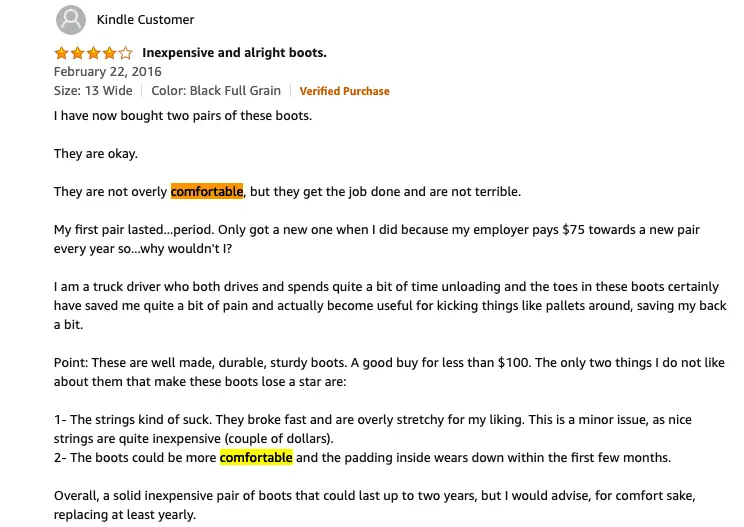
The steel toe boots have less toe space than alloy toe so people with broad feet might find it a bit uncomfortable. However steel boots are more durable than alloy toe and can last up to 1.5 to 2 years.
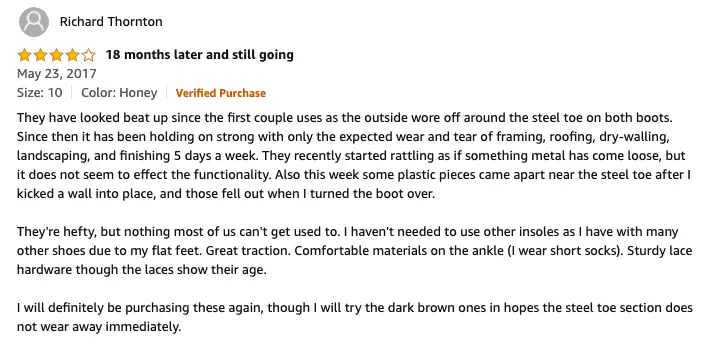
This breaks down to, how well your boot performs when accidentally a heavy load is dropped on your boot.
And this review lets you know that even when 100 lbs load is dropped on the steel toe boot the foot does not sustain any injury.
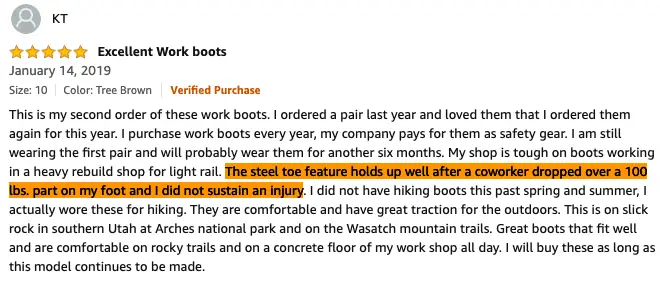
In general, you want to have “comfortable” footwear. So this you can easily make out from the people working in different occupations that steel toe boots are comfortable and safe.
Are Alloy Toe Boots Comfortable to Wear All Day?
Alloy toe gave no foot pain even after wearing them for 12 hours of the factory shift.
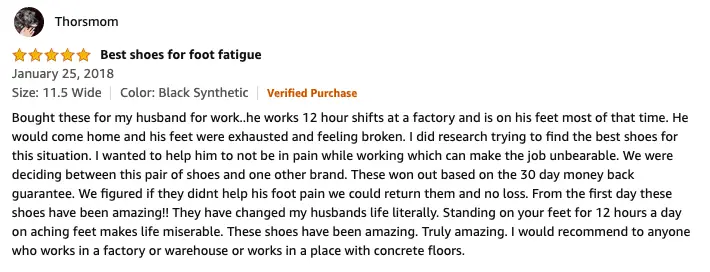
This was largely based on the fact warehouse worker has to take 10000 to 15000 steps a day.
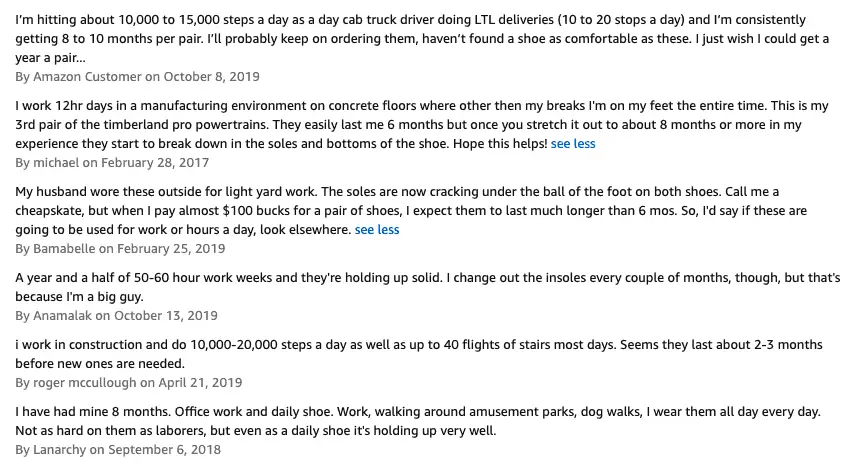
One thing to consider is that they usually last around 8-12 months. It CAN definitely be an issue. But it’s something that should be placed under a “thing to consider” an individual usage vs. something that impacts the durability of your shoes.
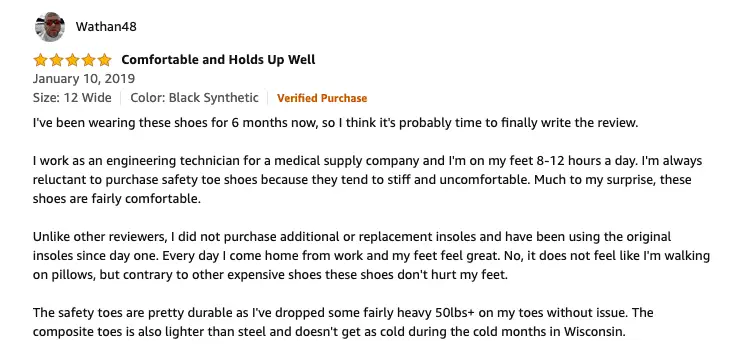
To me, those are NOT real problems that one should worry. So it’s nice to see that your shoe lasts longer. Unfortunately, these kinds of issues were with every Safety toe footwear whether alloy toe, steel toe or composite toe.
When it comes to comfort features, Alloy toe boots come out on top. It avoids any foot pain problems, lightweight makes it more comfortable. And in my opinion, it does a better job if you are a truck driver, warehouse worker or electrician where not much heavy equipment is involved.
Which Tool Is Best for Extreme Weather (Hot and Cold)?
Both Steel toe and Alloy toe have an effect in extreme weather.
Let’s see which one is better.
Steel Toe Boots in Hot and Cold Weather
Like any metal, steel toe will become cold in cold weather and hot in hot weather, Since metal is a good thermal conductor.

So what’s the solution?
According to OSHA cold stress guide, people working in cold weather should wear shoes with insulation and waterproof protection. So steel toe boots that are insulated should be the preference.
Alloy Toe Boots Effect of Hot and Cold Weather
Alloy Toe also has an effect of extreme weather.
That said, alloy toe does NOT conduct as much heat as steel because it is made of a material like titanium or other lightweight material. And titanium is NOT too cold or hot due to its low thermal conductivity.
In terms of extreme weather, Alloy Toe beats out Steel Toe. Both do what safety boots are supposed to do: protect from weather. But Alloy Toe is made from a less thermally conductive material, so conducts less heat or cold.
Which Toe will Set Off Metal Detectors?
 At this point, we’ve compared the main features of each toe. Now it’s time to look at some of the unique features that differentiate steel and alloy toe.
At this point, we’ve compared the main features of each toe. Now it’s time to look at some of the unique features that differentiate steel and alloy toe.
Alloy Toe Boots Metal Detector Test
In my opinion, one feature that has a lot of confusion is that will alloy toe set off metal detectors or not?
The answer is you “Cannot Be Sure”.
If you’ve ever worked at any security check or field before, then you know how this feature works.
The detector produces a magnetic field that detects metal. Having said that alloy toe has very little metal in shoes. In general not strong enough to blow off whistles at the security check. The only thing you can do is try going through the metal detector by wearing them.
For example, I tested a few and one did set off the metal detector.
Steel Toe Boots At Metal Detector Point
Steel toe will always set off metal detectors unlike alloy toe.
Steel toe boots literally have zero shield for metal detectors. So if you work with metal detectors in the field or at security check you should avoid them or remove them.
I have to say Alloy Toe is the overall winner in the “metal detectors” department. Honestly, both Alloy Toe and Steel Toe can set off the metal detector. But steel toe would do it always (would recommend composite toe).
Which Toe Is The Best Overall Value?
 Now it’s time to answer the question in your mind:
Now it’s time to answer the question in your mind:
“Which toe boot is going to give me the most value for my money?”.
Obviously, this depends A LOT on what’s your requirement. And what works for you.
For example, if you spend most of your day standing or walking on foot, you’ll appreciate that alloy toe boots are lightweight and feet will not feel TIRED.
But if you’re a construction worker who does heavy weightlifting, you’ll love that Steel Toe boots offer maximum protection.
With that discussion, here’s how the pricing for toe boots breaks down.
Steel Toe ranges from $30 all the way up to $300.
|
Steel Toe Boot |
Price |
|
Kingshow Men’s 1801 Work Boots |
$32 |
|
Caterpillar Men’s Second Shift Work Boot |
$75 |
|
Caterpillar Men’s Threshold Waterproof |
$100 |
| KEEN Utility Men’s Milwaukee Wide |
$180 |
| Chippewa Men’s 9″ Waterproof Insulated |
$290 |
For around 50-80 bucks, you can get a good pair of steel toe boots with the most important features (like waterproof, anti-slip and electrical protection) that meet ASTM F2413 standard.
Alloy Toe pricing is basically somewhat higher than Steel Toe ($60-$400… that depends on needs).
|
Alloy Toe Boot |
Price |
|
Timberland PRO Men’s 6″ Stockdale |
$70 |
|
KEEN Utility Men’s Manchester 6″ |
$110 |
|
Georgia Boot Men’s Carbo-Tec |
$175 |
| Timberland PRO Men’s AG Boss |
$235 |
| Danner Men’s Quarry USA 8 Inch |
$380 |
Like with Steel Toe, you can still find most of the main features with 80-120 price range.
When it comes to pure value, Steel Toe boots wins. That’s mostly because you get a fully protective footwear with all safety features at a price less than Alloy Toe.
Steel Toe vs. Alloy Toe Boots: And The Winner Is
 I’ve personally used both types of boots. I happily pay for each type of boot because I think they complement each other well.
I’ve personally used both types of boots. I happily pay for each type of boot because I think they complement each other well.
So to come up with a winner, I took the following factors into account:
-
-
- Protection features
- Weight
- Value
- Weather
- Metal Detectors
- Overall value
-
But if you had to make me pick ONE boot to use for Work, I’d have to go for Alloy Toe.
This was a REALLY hard call to make. I honestly think you can go with either type of boot.
And if you do any Heavy Weight work at all, I highly recommend Steel Toe over Alloy Toe.
But taking a big picture look at features, weight, comfort, overall value, I have crown Alloy Toe the winner here.
Now It’s Your Turn
And now it’s time to hear what you have to say.
When it comes to the Steel Toe vs. Alloy Toe battle, which boot do you prefer?
Are you Alloy Toe all the way?
Or do you prefer to use Steel Toe?
Let me know by leaving a comment below right now.


